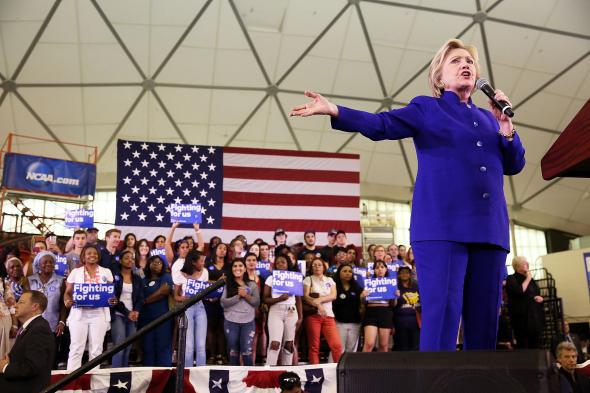Hillary Clinton is itching to turn her full attention to Donald Trump, but, before she can do that, she has one small thing in one big state to worry about: next week’s Democratic primary in California.
The two most recent surveys taken in the state show Clinton with a 2-point lead on Bernie Sanders. Those results were within the margin of error in both polls and whittled her average advantage in the state from nearly nine points down to six, according to RealClearPolitics’ rolling tally. Hillary, though, remains the overwhelming favorite. Nate Silver and his FiveThirtyEight team, for instance, peg her chances of victory at 90 percent or greater.
Still, there are signs of real worry in Clinton’s camp. Hillary and husband Bill have scheduled more than 30 campaign stops in the Golden State during the five days before Tuesday’s primary. While the most high-profile of those events—a foreign policy speech Thursday—will focus on Trump rather than Sanders, the fact that she chose to deliver it in San Diego as opposed to New Jersey, where she was originally expected to campaign that day, is telling. She and her allies know a come-from-behind victory in California by her Democratic rival will put her on the defensive at a time when she’s eager to go on the attack against the man she’ll face in the general election.
So what, exactly, is at stake in California? In the short term, plenty. A loss in the final marquee nominating contest would, obviously, be a bad look for a party’s presumptive nominee. It would spark another round of unflattering headlines and plenty of more handwringing by nervous Democrats who have watched a once-fractured Republican Party start to rally around Trump much faster than many expected. It would also give Sanders extra motivation—and justification—to take his quixotic fight the whole way to the floor of the Democratic National Convention in July, which would prevent the party from unifying for another two months and could even fracture it further.
Still, any setbacks Hillary suffers in California would be temporary. Then-Sen. Barack Obama lost California to Clinton by eight points in 2008. And while that California primary was in February, Obama also failed to sweep the final nominating contests that year. Clinton won four of the seven state contests held in May or later in 2008. Hillary’s supporters, though, came around in the general election. Bernie’s are likely to do the same this time. (And, if they don’t, it’s hard to believe the California primary will be the reason why.)
More importantly, a Sanders victory wouldn’t fundamentally change the cold, hard math that is likely to make Clinton her party’s presumptive nominee before Californians are even done casting their ballots Tuesday. According to the Associated Press’ current count, Hillary needs only 71 delegates to clinch the nomination. After this weekend’s Democratic caucuses in the U.S. Virgin Islands and Puerto Rico, that number should fall in to the 50s and possibly lower. She’s expected to cross the 2,383-delegate threshold when the polls close in New Jersey on Tuesday evening, three hours or so earlier than they will on the opposite coast.
Team Sanders will complain—and already is complaining—that declaring Hillary the presumptive nominee then will be unfair because it assumes the superdelegates will vote how they say they will. But such arguments ignore the fact that Clinton leads Sanders on pretty much every electoral metric you can think of: She’s won more states, more pledged delegates, and more votes than Sanders this year. Yes, superdelegates can still change their mind, but there’s no good reason to think they will. Meanwhile, Bernie very well may fight on past Tuesday as he has promised to do, but his case wouldn’t actually be much stronger even with a win in California. He wants superdelegates to reflect the will of Democratic voters, but a clear majority of those voters will still have backed Clinton.
Of course there’s the other possible outcome: Clinton could win in California. Doing that would allow her to finish strong and take the wind out of Sanders’ sails. It won’t change the reality that she still needs to persuade his diehard supporters to join her cause in the name of stopping Trump, but it will allow her to start taking more shots at the presumptive GOP nominee those voters loathe and fewer at the Vermont senator they love.
